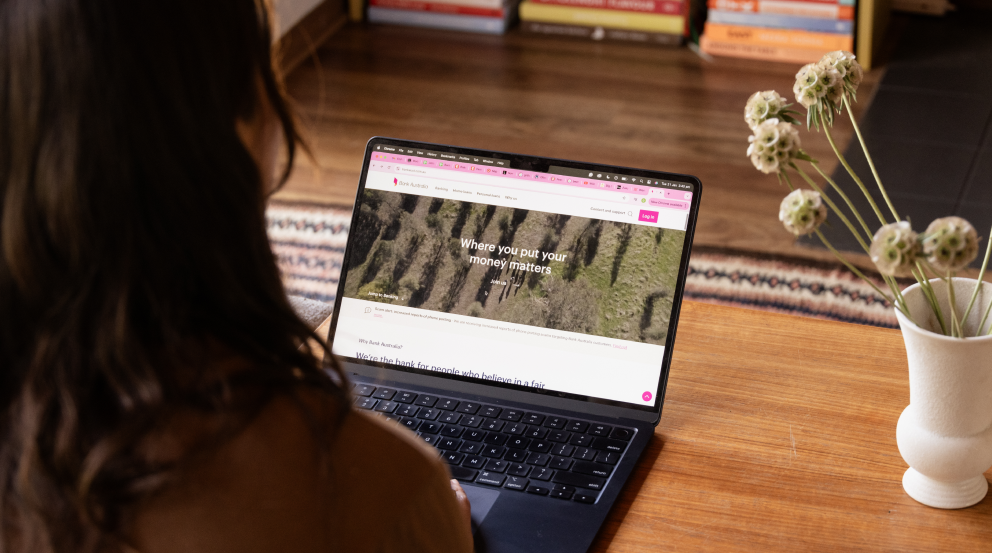Bank Australia customer Karlee Sangster (they/them) has done, in their own words, “20,000 things”, including shoe-making, tailoring, hospitality, freelance writing and art therapy. These days they work (mostly) as a positive behaviour support specialist and consultant. It’s their job to help people live better, and help companies do better.
During the pandemic, teacher, consultant and positive behaviour support specialist Karlee Sangster noticed something interesting. For the first time ever, a lot of people were experiencing a fraction of what it’s like to actually live with a disability.
“Think about it,” they say. “You couldn’t go anywhere, you were worried about getting sick, you couldn’t access certain places, or only go at certain times. That’s the day-to-day reality for lots of people.”
This collective experience came with an increased awareness of accessibility issues and sparked a turning point for Karlee, who has a background in art therapy and education, to make the move into access consulting.
It all started when they were trying to use teaching resources a major gallery had developed for kids. Karlee realised these resources were unsuitable for anyone who wasn’t cis, white, English-speaking or able-bodied.
.webp)
“I was having to do all this work, adapting these resources for students, and I just thought, ‘This is ridiculous!’ The gallery had a disability action plan, but their ‘resources’ were basically one colouring-in sheet with the word ‘autism’ written on top,” Karlee recalls. “So I emailed them and said, ‘Look, you’ve said you’re going to do this, but you’re not. You can pay me to do it.’”
That email kickstarted Karlee’s new career as an independent consultant, helping organisations navigate the world of disability and accessibility.
This means letting companies know where there are opportunities to improve. Say you’re running a festival. How do you make sure your facilities and your program are suitable for wheelchair users, or people with autism? Do you have a sensory room? How about Auslan interpreters and captioning? If you’re running a school, are there adequate support resources for neurodivergent kids, or children with disabilities?
“For a lot of places, it’s like, ‘Okay, you have a ramp outside. Then what?’” Karlee says. “Mostly it’s looking at holes, or gaps in the service. You take a look at a company, or an event, and ask, ‘Who’s not at the table? Who’s absent from this space? And how can we bring those people in?’”
Making space for people with lived experience is something that Karlee, who wears a hearing aid but doesn't necessarily identify as a disabled person, feels strongly about. They are not “an awesome hero who is saving people”. Instead, they see their role as listening to and amplifying the voices of people with lived experiences of disability.
.webp)
“It’s really important for me – as a vaguely middle class, able-bodied person – that I don't just come in and be the ‘expert’,” Karlee says. “It’s more about co-design. Working with these communities to create spaces that suit them.”
Even though Karlee has been working in the disability space for years, they stress the need to be always listening and learning. “There's so much stuff that I would never have thought about before I got into this line of work,” they said.
In fact, Karlee’s route to disability access work was non-linear. They live in East Brunswick now, with their son, Cedric, but they grew up in Brisbane. They got their break as an art therapist in Ipswich, working with kids with special needs. “I was very green and fresh to the whole environment,” they laugh. “Looking back I said some really problematic things, as you do when you're learning.”
Then they moved to Melbourne and along a career path that spanned hospitality, cobbling shoes, an at-home tailoring business, freelance writing, and creating ceramics (which they still do). Eventually, they found their way to a career as a positive behaviour support specialist. It’s their job to help people with “behaviours of concern”.
.webp)
“It might be a sexual thing, or a violence thing. It could be hoarding. Anything that’s not serving the person,” they say.
Throughout their career, Karlee has noticed a shift in the public’s approach to people with disabilities. Today there’s more widespread acceptance from companies and individuals that things need to change; that certain people need additional support, or extra resources, or dedicated spaces just for them.
While this level of visibility and awareness might feel new, Karlee points to the long legacy of disability advocates who deserve recognition for their decades of work. “There have always been people with disabilities advocating for their needs,” they say.
.webp)
As one of our Impact Term Deposit customers, Karlee says they’re keen to see more organisations, including Bank Australia, get creative when it comes to disability access and inclusion, as well as openly advocating for trans and gender-diverse folk.
They draw parallels between the creativity that they bring to ceramics and to their work in accessibility.
“Creating resources for kids and creating a mug give me the same creative buzz,” Karlee says. “And just like with clay, there are certain rules and techniques you need to learn. Otherwise it falls to pieces. But within that space, the potential for creative solutions is almost endless.”




.png)



